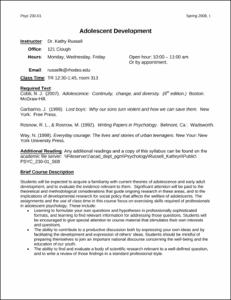Please use this identifier to cite or link to this item:
http://hdl.handle.net/10267/3620| Title: | PSYC 230-01, Principles of Development: Adolescence and Young Adulthood, Spring 2008 |
| Authors: | Russell, Kathy |
| Keywords: | Psychology, Department of;Syllabus;Curriculum;Academic departments;Text;2008 Spring |
| Issue Date: | 9-Jan-2008 |
| Publisher: | Memphis, Tenn. : Rhodes College, Memphis, TN |
| Series/Report no.: | Syllabi CRN 28500 |
| Abstract: | Students will be expected to acquire a familiarity with current theories of adolescence and early adult development, and to evaluate the evidence relevant to them. Significant attention will be paid to the theoretical and methodological considerations that guide ongoing research in these areas, and to the implications of developmental research for social policy that affects the welfare of adolescents. The assignments and the use of class time in this course focus on exercising skills required of professionals in adolescent psychology. These include: • Learning to formulate your own questions and hypotheses in professionally sophisticated formats, and learning to find relevant information for addressing those questions. Students will be encouraged to give special attention to course material that stimulates their own interests and questions. • The ability to contribute to a productive discussion both by expressing your own ideas and by facilitating the development and expression of others’ ideas. Students should be mindful of preparing themselves to join an important national discourse concerning the well-being and the education of our youth. • The ability to find and evaluate a body of scientific research relevant to a well-defined question, and to write a review of those findings in a standard professional style.There are three major themes that will continually come into focus throughout this course. These will come into our conversations as we consider every aspect of development. • Most theorists recognize the primary psychological tasks of adolescence are organized around the development of something we call “identity.” We will be occupied frequently with considerations of what we mean by identity development, and of how this construct relates to the various “problems” of adolescence and to our efforts to improve the well-being and the education of our youth. • It is difficult to avoid the conclusion that gender and sexuality are pre-eminent features in the world of adolescence. Although some theorists believe that gender identity is established years earlier, no one disputes the notion that the adoption of gendered roles and coming to terms with sexuality and gender are critical challenges for this part of the life cycle. Many of the experiences, opportunities, and outcomes of adolescent development may be different in interesting ways for girls and boys. Few topics in adolescent development can be understood without considering how they relate to questions of gender and identity. • We will find that ‘adolescence’ has very different meanings depending on the socio-cultural and historical context. We will examine ways that adolescent development is influenced by (a) media messages and general beliefs about what teens are like and how they can be expected to behave, and (b) cultural norms that specify the appropriate times for economic independence, marriage, childbearing, etc. The experiences, opportunities, and outcomes of adolescent development vary markedly and in interesting ways for individuals in different ethnic and racial groups and for teens with different cultural traditions. We must be careful not to talk about “adolescent development” without asking “Which adolescents?” |
| Description: | This syllabus was submitted to the Office of Academic Affairs by the course instructor. |
| URI: | http://hdl.handle.net/10267/3620 |
| Appears in Collections: | Course Syllabi |
Files in This Item:
| File | Description | Size | Format | |
|---|---|---|---|---|
| 2008_sp_PSYC_230-01_28500.pdf | 58.37 kB | Adobe PDF |  View/Open |
Items in DSpace are protected by copyright, with all rights reserved, unless otherwise indicated.